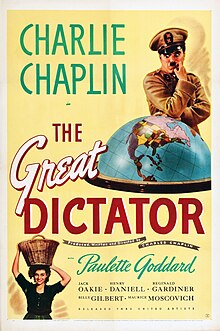
Back The Great Dictator AN الديكتاتور العظيم (فيلم) Arabic الديكتاتور العظيم ARZ The Great Dictator AST Böyük diktator Azerbaijani Вялікі дыктатар Byelorussian Вялікі дыктатар BE-X-OLD Великият диктатор Bulgarian দ্য গ্রেট ডিক্টেটর Bengali/Bangla The Great Dictator Breton
| The Great Dictator | |
|---|---|
 Theatrical release poster | |
| Directed by | Charlie Chaplin |
| Written by | Charlie Chaplin |
| Produced by | Charlie Chaplin |
| Starring | |
| Cinematography | |
| Edited by |
|
| Music by |
|
Production company | |
| Distributed by | United Artists |
Release date |
|
Running time | 125 minutes[1] |
| Country | United States |
| Language | English |
| Budget | $2.2 million[2] |
| Box office | $5 million (worldwide rentals)[3] |
The Great Dictator is a 1940 American anti-war, political satire, and black comedy film written, directed, produced, scored by, and starring British comedian Charlie Chaplin, following the tradition of many of his other films. Having been the only Hollywood filmmaker to continue to make silent films well into the period of sound films, Chaplin made this his first true sound film.
Chaplin's film advanced a stirring condemnation of the German and Italian dictators Adolf Hitler and Benito Mussolini, as well as fascism, antisemitism, and the Nazis. At the time of its first release, the United States was still at peace with Nazi Germany and neutral during what were the early days of World War II. Chaplin plays both leading roles: a ruthless fascist dictator and a persecuted Jewish barber.
The Great Dictator was popular with audiences, becoming Chaplin's most commercially successful film.[4] Modern critics have praised it as a historically significant film, one of the greatest comedy films ever made and an important work of satire. Chaplin's climactic monologue has frequently been listed by critics, historians and film buffs as perhaps the greatest monologue in film history, and possibly the most poignant recorded speech of the 20th century.[citation needed] In 1997, it was selected by the Library of Congress for preservation in the United States National Film Registry as being "culturally, historically, or aesthetically significant".[5][6] The Great Dictator was nominated for five Academy Awards – Outstanding Production, Best Actor, Best Writing (Original Screenplay), Best Supporting Actor for Jack Oakie, and Best Music (Original Score).
In his 1964 autobiography, Chaplin stated that he could not have made the film if he had known about the true extent of the horrors of the Nazi concentration camps at that time.[7]
- ^ "The Great Dictator (U)". British Board of Film Classification. December 9, 1940. Retrieved November 3, 2012.
- ^ "UA Meeting". Variety. November 20, 1940. p. 20.
- ^ Friedman, Barbara G. (2007). From the Battlefront to the Bridal Suite: Media Coverage of British War Brides, 1942-1946. University of Missouri Press. ISBN 978-0-8262-1718-9.
Charlie Chaplin's 1940 film The Great Dictator, satirizing Hitler and Nazism, grossed $5 million worldwide and became a classic.
- ^ Cite error: The named reference
trampdictwas invoked but never defined (see the help page). - ^ Cite error: The named reference
:0was invoked but never defined (see the help page). - ^ "New to the National Film Registry (December 1997) – Library of Congress Information Bulletin". www.loc.gov. Retrieved June 23, 2020.
- ^ Chaplin, Charlie (1964). My Autobiography. New York, Simon and Schuster. p. 392.
Had I known of the actual horrors of the German concentration camps, I could not have made The Great Dictator, I could not have made fun of the homicidal insanity of the Nazis